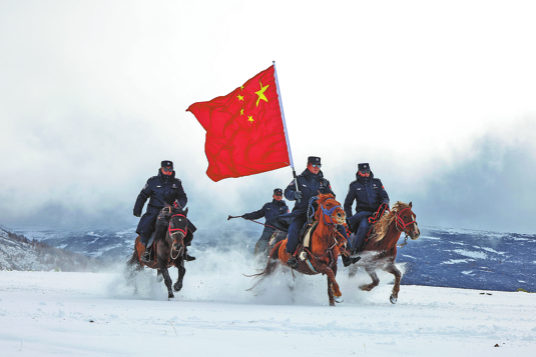China, Russia urge nuclear-weapon states to abandon Cold War mentality: joint statement

MOSCOW -- China and Russia urged nuclear-weapon states to abandon the Cold War mentality and zero-sum games, according to a joint statement on global strategic stability released here on Thursday.
The two sides emphasized the importance of maintaining a constructive relationship among major countries in addressing global strategic issues.
Noting that nuclear-weapon states bear special responsibilities for international security and global strategic stability, the statement said that they should give up taking measures that trigger strategic risks, and concerns should be addressed through equal dialogue and consultations based on mutual respect to enhance trust and avoid dangerous misjudgments.
The statement noted that not all nuclear-weapon states follow the above-mentioned position, saying the rising tensions among nuclear-weapon states have escalated, even to the point of facing direct military conflicts, adding that problems and challenges in the strategic domain keep emerging, and the risk of nuclear conflicts is rising.
According to the statement, the fact that certain nuclear-weapon states build or expand permanent military bases in sensitive areas around other nuclear-weapon states, flex military muscle to exert pressure, or carry out hostile acts that threaten the core security interests of other countries has become one of the most urgent strategic risks to be eliminated.
Meanwhile, the forward deployment of military facilities and advanced offensive and defensive weapons have been continuously strengthened, a trend that has raised serious concerns.
The recently announced "Golden Dome" plan of the United States aims to build a global, multi-level and multi-domain missile defense system that is not subject to any constraints to resist various missile threats, including those from "evenly matched" opponents, said the statement, adding that it also causes serious damage to strategic stability.
This plan completely and thoroughly negates the inseparable interrelationship between strategic offensive and strategic defensive arms, the core principle on maintaining global strategic stability. In addition, this plan also provides further support for the research and development of kinetic and non-kinetic means to strike missiles and their supporting facilities and achieve "left-of-launch."
The "Golden Dome" program openly proposed a significant increase in outer space combat means, including the development and deployment of orbital interception systems, weaponizing outer space and turning it into a large-scale armed confrontation site, which made the situation even worse, said the document.
The two countries oppose the attempts of individual countries to use outer space for armed confrontation, and reject the implementation of security policies and activities aimed at gaining military superiority and defining outer space and using it as a "war-fighting domain."
China and Russia condemned the use of commercial space systems to interfere in the internal affairs of sovereign states and intervene in armed conflicts of other countries.
Some individual nuclear-weapon state, supported by its allies, aims to undermine the reliability and effectiveness of the strategic deterrence of other nuclear-weapon states, revealing the attempt to seek overwhelming military superiority, and ultimately achieve "absolute strategic security." It fundamentally violates the basic logic of maintaining strategic balance and runs counter to the principle of equal and indivisible security, according to the statement.
Any military confrontation among nuclear-weapon states should be resolutely avoided, said the document, adding that political and diplomatic solutions to existing differences should be sought on the basis of mutual recognition of and mutual respect for each other's security interests and concerns.
Both sides pointed out in the statement that through a trilateral security partnership, the United States, Britain and Australia attempt to establish military facilities used by the two nuclear-weapon states to safeguard their nuclear forces within the territory of a signatory to the South Pacific Nuclear Free Zone Treaty, undermining regional strategic stability and provoking a regional arms race.
- Teen donates to preserve war truths in Nanjing
- China and US anti-narcotics agencies cooperate to crack a cocaine smuggling case
- Stealth drone's trial lands desired results
- China grants first Level-3 autonomous driving vehicle permits
- AI-led model aids cultural relic restoration and boosts tourism
- China's top legislature schedules session for December





































